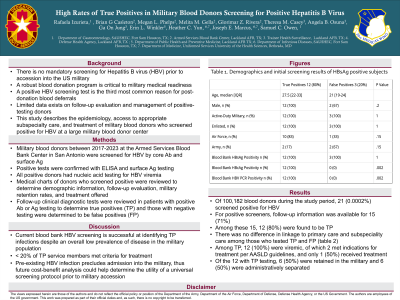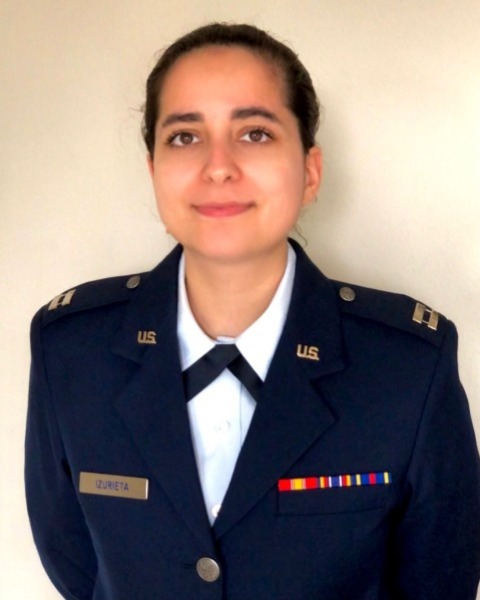Tuesday Poster Session
Category: Liver
P4668 - High Rates of True Positives in Military Blood Donors Screening for Positive Hepatitis B Virus
Tuesday, October 29, 2024
10:30 AM - 4:00 PM ET
Location: Exhibit Hall E

Has Audio

Rafaela Izurieta, MD
Brooke Army Medical Center
San Antonio, TX
Presenting Author(s)
Rafaela Izurieta, MD, Samuel C. Owen, MD, Joseph E. Marcus, MD, Brian G. Casleton, MS, Megan Phelps, BS, Melita M. Gella, , Glorimar Rivera, , Theresa M. Casey, MPH, Angela B. Osuna, MPH, Ga On Jung, MPH, Erin Winkler, MD, MPH, Heather C. Yun, MD
Brooke Army Medical Center, San Antonio, TX
Introduction: The United States’ military currently has no screening program for Hepatitis B virus (HBV) prior to accession, however many military trainees undergo screening during blood donation as part of routine blood bank protocol. While HBV is the third most common reason for post-donation blood deferrals, there is limited data on the follow-up evaluation of those who test positive. This study describes the epidemiology, access to appropriate subspecialty care, and treatment of military blood donors who screened positive for HBV at a large military blood donor center.
Methods: All military blood donors between 2017-2023 at the Armed Service Blood Bank Center-San Antonio were screened for HBV by core antibody and surface antigen screens and confirmed with an enzyme-linked immunosorbent assay (ELISA) and with surface antigen testing. Additionally, all donors had nucleic acid testing for HBV viremia. The medical charts of donors who screened positive were reviewed to determine demographic information, follow-up evaluation, military retention rates, and treatment rates. On follow-up clinical diagnostic tests, patients with positive antibodies or antigen testing were determined to true positives (TP) and those with negative testing were determined to be false positives (FP).
Results: Of the 100,182 blood donors during the study period, 21 (0.0002%) screened positive for HBV, of which adequate follow-up information was available for 15 (71%). Of these 15, 12 (80%) were found to be TP. TP donors were more likely to have higher rates of positive nucleic acid testing (100% vs 0%, p=0.002) after blood donation (table 1). There was no difference in linkage to primary care and subspeciality care among those who tested TP and FP (table 2). Of those with TP testing, 12 (100%) were viremic, of which 2 met indications for treatment per American Association for Liver Diseases guidelines, and only 1 (50%) received treatment. Of the 12 with TP testing, 6 (50%) were retained in the military and 6 (50%) were administratively separated.
Discussion: Current blood bank HBV screening is successful at identifying true positive infections despite an overall low prevalence of disease in the military population. Additionally, < 20% of TP service members met criteria for therapy. As a pre-existing HBV infection precludes admission into the military, future cost-benefit analysis could help determine the utility of a universal screening protocol prior to military accession.
Note: The table for this abstract can be viewed in the ePoster Gallery section of the ACG 2024 ePoster Site or in The American Journal of Gastroenterology's abstract supplement issue, both of which will be available starting October 27, 2024.
Disclosures:
Rafaela Izurieta, MD, Samuel C. Owen, MD, Joseph E. Marcus, MD, Brian G. Casleton, MS, Megan Phelps, BS, Melita M. Gella, , Glorimar Rivera, , Theresa M. Casey, MPH, Angela B. Osuna, MPH, Ga On Jung, MPH, Erin Winkler, MD, MPH, Heather C. Yun, MD. P4668 - High Rates of True Positives in Military Blood Donors Screening for Positive Hepatitis B Virus, ACG 2024 Annual Scientific Meeting Abstracts. Philadelphia, PA: American College of Gastroenterology.
Brooke Army Medical Center, San Antonio, TX
Introduction: The United States’ military currently has no screening program for Hepatitis B virus (HBV) prior to accession, however many military trainees undergo screening during blood donation as part of routine blood bank protocol. While HBV is the third most common reason for post-donation blood deferrals, there is limited data on the follow-up evaluation of those who test positive. This study describes the epidemiology, access to appropriate subspecialty care, and treatment of military blood donors who screened positive for HBV at a large military blood donor center.
Methods: All military blood donors between 2017-2023 at the Armed Service Blood Bank Center-San Antonio were screened for HBV by core antibody and surface antigen screens and confirmed with an enzyme-linked immunosorbent assay (ELISA) and with surface antigen testing. Additionally, all donors had nucleic acid testing for HBV viremia. The medical charts of donors who screened positive were reviewed to determine demographic information, follow-up evaluation, military retention rates, and treatment rates. On follow-up clinical diagnostic tests, patients with positive antibodies or antigen testing were determined to true positives (TP) and those with negative testing were determined to be false positives (FP).
Results: Of the 100,182 blood donors during the study period, 21 (0.0002%) screened positive for HBV, of which adequate follow-up information was available for 15 (71%). Of these 15, 12 (80%) were found to be TP. TP donors were more likely to have higher rates of positive nucleic acid testing (100% vs 0%, p=0.002) after blood donation (table 1). There was no difference in linkage to primary care and subspeciality care among those who tested TP and FP (table 2). Of those with TP testing, 12 (100%) were viremic, of which 2 met indications for treatment per American Association for Liver Diseases guidelines, and only 1 (50%) received treatment. Of the 12 with TP testing, 6 (50%) were retained in the military and 6 (50%) were administratively separated.
Discussion: Current blood bank HBV screening is successful at identifying true positive infections despite an overall low prevalence of disease in the military population. Additionally, < 20% of TP service members met criteria for therapy. As a pre-existing HBV infection precludes admission into the military, future cost-benefit analysis could help determine the utility of a universal screening protocol prior to military accession.
Note: The table for this abstract can be viewed in the ePoster Gallery section of the ACG 2024 ePoster Site or in The American Journal of Gastroenterology's abstract supplement issue, both of which will be available starting October 27, 2024.
Disclosures:
Rafaela Izurieta indicated no relevant financial relationships.
Samuel Owen indicated no relevant financial relationships.
Joseph Marcus indicated no relevant financial relationships.
Brian Casleton indicated no relevant financial relationships.
Megan Phelps indicated no relevant financial relationships.
Melita Gella indicated no relevant financial relationships.
Glorimar Rivera indicated no relevant financial relationships.
Theresa Casey indicated no relevant financial relationships.
Angela Osuna indicated no relevant financial relationships.
Ga On Jung indicated no relevant financial relationships.
Erin Winkler indicated no relevant financial relationships.
Heather Yun indicated no relevant financial relationships.
Rafaela Izurieta, MD, Samuel C. Owen, MD, Joseph E. Marcus, MD, Brian G. Casleton, MS, Megan Phelps, BS, Melita M. Gella, , Glorimar Rivera, , Theresa M. Casey, MPH, Angela B. Osuna, MPH, Ga On Jung, MPH, Erin Winkler, MD, MPH, Heather C. Yun, MD. P4668 - High Rates of True Positives in Military Blood Donors Screening for Positive Hepatitis B Virus, ACG 2024 Annual Scientific Meeting Abstracts. Philadelphia, PA: American College of Gastroenterology.
